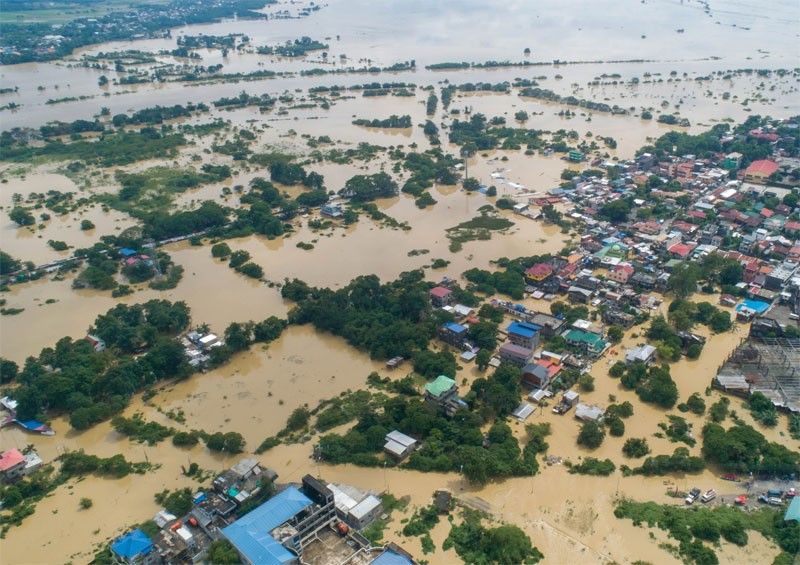Disaster responsive 2023 national budget eyed

MANILA, Philippines — The Senate will review and “readjust” some provisions of the proposed P5.268-trillion national budget to make it more responsive to disasters, as the chamber prepares its plenary deliberations on the appropriations measure upon the resumption of Congress session on Nov. 7, Senate President Juan Miguel Zubiri said.
The Senate finance committee, chaired by Sen. Sonny Angara, endorsed for plenary approval the proposed budget before Congress went into recess last month.
Senators are expected to hold marathon deliberations on the General Appropriations Bill with the aim of passing it before the end of the month.
“With the recent earthquake in Abra and now Paeng, our 2023 budget will definitely have to be reconsidered, reviewed and adjusted – not only for the rehabilitation of affected communities, but also to strengthen the capacity of the NDRRMC and related agencies and local governments,” Zubiri said in a statement, referring to the National Disaster Risk Reduction and Management Council.
“We need to fix our fragmented disaster management efforts and adopt a whole-of-government approach going forward,” he said.
Speaker Martin Romualdez also said he is open to adjustments in the budget for the same reason. “We will do everything in our power to help our kababayans recover from this disaster once again,” Romualdez said in a statement.
The Marcos administration is asking for P31 billion in calamity funds to be administered by the NDRRMC.
Zubiri said the Senate is organizing relief operations across the country and that he himself would be in Mindanao, which was hardest hit and where most of the casualties were reported.
Zubiri also expressed support for the NDRRMC’s recommendation to declare a national state of calamity to allow the national and local governments access to calamity funds.
Romualdez, meanwhile, said he has asked appropriations committee chairman Rep. Zaldy Co (Ako Bicol party-list) to make a comprehensive assessment of the damage and destruction wrought by Paeng to “aid us in reviewing possible adjustments in budget allocation for repair and rehabilitation of affected areas under the proposed 2023 General Appropriations Act.”
The House has already passed the proposed budget for next year on third and final reading.
Rep. Janette Garin (Iloilo), for her part, reminded government that two to three more cyclones are expected to enter the Philippine area of responsibility this month and two more in December.
While the country has available funds for national disasters, these should be “used accordingly,” Garin, deputy majority leader, said.
“There really is a sense of urgency, that is why power has to be restored and so are potable water and access roads but we need to be vigilant about interpreting needs versus wants,” she said.
“We should be very careful and judicious in utilizing our funds because we all know that using these funds will not be limited to Paeng alone. There is also the threat of eruption of Mt. Mayon whose alert level has been raised to Alert Level 2. So is Taal volcano,” she added.
“And we also have to remember the recent earthquake that took place in Abra,” Garin said.
Price freeze
Meanwhile, the Department of Trade and Industry (DTI) is reminding business establishments that a price freeze on basic necessities is currently in effect in areas under a state of calamity due to Tropical Storm Paeng.
In a Viber message to reporters yesterday, Trade Undersecretary Carol Sanchez said a price freeze is in effect in the Bangsamoro Autonomous Region in Muslim Mindanao, Albay and Picgcawayan, Cotabato.
“We will continue to monitor and provide feedback on possible concerns,” Sanchez said.
“The DTI is closely coordinating with the Office of the Civil Defense on the declarations of state of calamity,” Trade Secretary Alfredo Pascual said.
“Automatic price freeze shall apply to basic necessities. Establishments found violating the price freeze may be subjected to administrative cases and fines,” he added.
Pascual said DTI monitoring teams in affected regions and provinces were checking supermarkets and grocery stores to ensure availability of supply and stability of prices.
“We also encourage consumers to be vigilant and report any violation or incident of overpricing or hoarding,” Pascual added.
Under Republic Act No. 7581, or the Price Act, as amended, prices of basic necessities are automatically frozen for 60 days in areas placed under a state of calamity.
The DTI monitors basic necessities under its purview such as canned fish, locally manufactured instant noodles, bottled water, bread, processed milk, coffee, candles, laundry soap, detergent and salt.
Other agencies implementing the Price Act ensure price stability and availability of supply of products under their jurisdiction.
The Department of Agriculture is in charge of rice, corn, cooking oil, fresh, dried and other marine products, fresh eggs, fresh pork, beef and poultry meat, fresh milk, fresh vegetables, root crops, sugar and fresh fruits while the Department of Health takes care of drugs classified as essential.
Owners of business establishments found violating the Price Act face imprisonment of one to 10 years or a fine ranging from P5,000 to P1 million, or both.
The price freeze shall be automatically lifted on their end date unless sooner lifted by the President.
The DTI is urging consumers to report retailers, distributors and manufacturers that sell basic necessities above their prevailing prices via One-DTI (1-384) Hotline or email, ConsumerCare@dti.gov.ph. – Delon Porcalla, Catherine Talavera
- Latest
- Trending


























